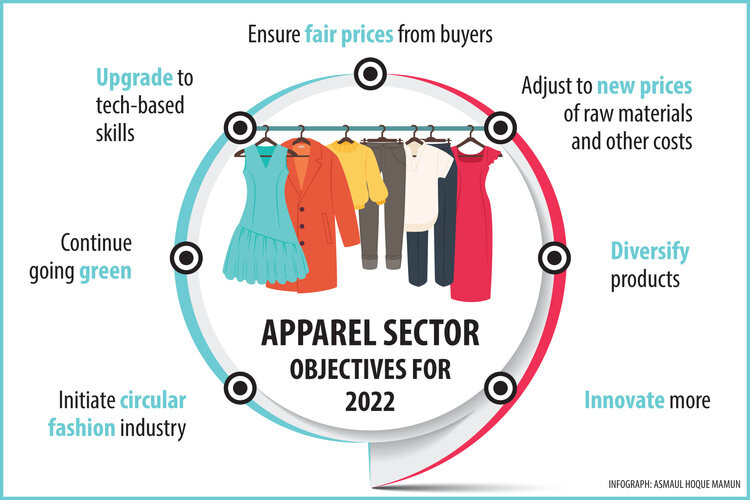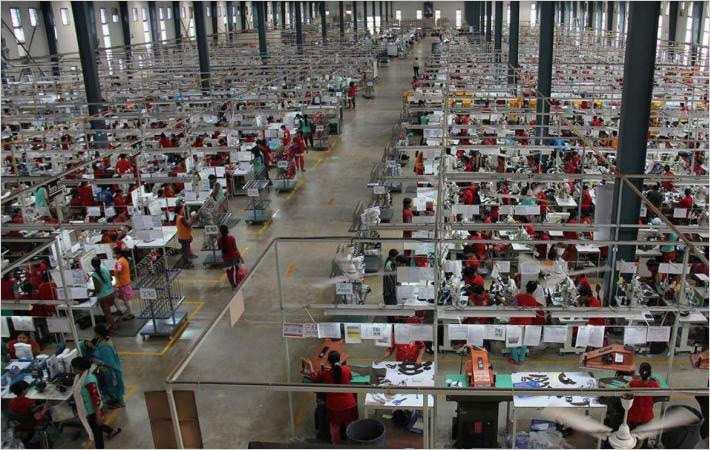Manufacturers and exporters are losing out as the cost of production increases significantly
In 2021 the price of yarn and cotton almost doubled, the price of fuel also increased which led to the rise in freight costs by 200% to 300%, causing a significant increase in the overall cost of production.
Exporters had to bear all these costs as the buyers did not increase the prices as expected.
Due to this, even though the export had increased in terms of quantity, the profit has been much less.
The manufacturers and the experts said that in 2022, achieving fair prices in line with export expenditure will be a major challenge for the country’s apparel sector.
Talking to Dhaka Tribune, Prof Mustafizur Rahman, a distinguished fellow of the CPD, said that the biggest challenge for the RMG sector is the rise in prices of raw materials in the global market.
He added saying that a large portion of imports costs are spent on purchasing raw materials and production equipment.
He also said that last year saw a change in the trend of imports and exports and the trend was volume-driven.
The buyers however did not take the pressure of the increased price of raw materials causing the manufacturers and exporters to lose out.
He also said that the situation needs to return to a state of balance in 2022.
Moreover, the apparel manufacturers have agreed to form a joint committee to set a minimum price and manufacturing cost of apparel items.
Earlier in a statement, Faruque Hassan, president of the Bangladesh Garment Manufacturers and Exporters Association (BGMEA), urged the manufacturers to pay more attention to price calculation and not to sell products at a price lower than the cost of production.
He also urged them to be more careful about price negotiations and price calculation.
Talking to Dhaka Tribune, Shahidullah Azim, vice president of the BGMEA said that they are working on minimum price benchmarking, and buyers know it.
“No one can take any order below the benchmarked price. Again, no unhealthy competition can be made among ourselves,” he added.

Raw materials become dearer
Global inflation had an impact on the price of raw materials of the apparel sector.
Mohiuddin Rubel, director of the BGMEA told Dhaka Tribune that the sector has a lot of challenges ahead of them in 2022.
“No matter how well we do, we have to face these challenges. One of the challenges is the increase of the price of raw materials in the global market,” he added.
He also said that although they have to bear this increased cost in exporting goods, they are not able to sell garments at higher prices. Again, adjusting prices is one of their challenges this year.
Omicron variant
The recent surge of cases of the Omicron variant in the export destinations might put the apparel sector in jeopardy again in 2022.
Shahidullah Azim said that the world has not yet recovered from the outbreak of the coronavirus. The spread of new variants is still could hamper world trade.
“Therefore, Coronavirus is still the biggest obstacle in our process of turning around and moving forward,” he added.
Mohiuddin Rubel said that this is also a big challenge for obtaining new purchase orders in 2022.
“We are looking forward to 2022, however, the new year starts with an uncertainty, as we do not know what effect the new variant of Covid-19 will have,” he added.
He also said that overcoming the pandemic is one of the biggest challenges.
Diversification and innovation: Key to compete in the global market
Experts and manufacturers think that that the country should have a long-term strategy to sustain the historic export growth which the apparel sector experienced in 2021.
To increase productivity, companies need to invest in technology-based skills growth and focus on product diversification to compete in the global market.
Talking to Dhaka Tribune, Faruque Hassan said that they are already working on market diversification, which will get more dynamism in 2022.
“Soon, we will open an Innovation Center, for the first time in the country. This is going to be one of the major initiatives for the development of the apparel sector. We will focus more on innovation and skill development,” he added.
He also said that there will be more research on product diversification and design at the innovation center.
Prof Mustafizur Rahman also said that export products need to be further diversified.
“Let’s not forget that LCD graduation is going to have a big impact on our exports and we have to be prepared,” he added.
Moreover, the government and policymakers need to take more far-sighted and timely decisions in formulating import-export support policies, he also said.
2022: An expectation for a sustainable industry
The manufacturers also expect that in 2022, they will focus on establishing a sustainable, energy-efficient, and eco-friendly apparel industry.
“Our carbon emissions rate is very low, yet we are trying to figure out ways to reduce it further and make the industry more energy-efficient,” said BGMEA President Faruque Hassan.
He also said that they want to do more with recycling, circular economy, and innovation.
“At the same time, we can move the economy forward, build a clean and green society, and create more jobs,” he added.

Hoping for a better 2022
If the Omicron variant does not cause an unprecedented situation, exporters expect that the first six to seven months of 2022 will be a good time for them.
“The apparel sector will continue to play a vital role in turning the other relevant sectors of our economy,” said CPD Fellow Mustafizur Rahman.
He also said that the RMG sector will also play a supportive role in 2022 in the cooperation of small entrepreneurs, the creation of new employment, and strengthening the export earnings.
Faruque Hassan said that last year’s decision they had to make to balance life and livelihood with the help of the government was a wise one.
“We will move forward this year too by tackling any situation through strenuous efforts and necessary policies of the government,” he added.
Shahidullah Azim said that the business-friendly governmental policies will keep the industry afloat for years to come.
He also added saying the repayment time for incentives also requires increasing.
Mohiuddin Rubel said that they will move forward by ensuring the safety and rights of all the workers and by maintaining compliance.
















